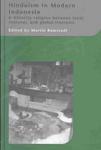
Book Summary
Provides new data and perspectives on the development of 'world religion' in post-colonial societies through an analysis of the development of 'Hinduism' in various parts of Indonesia from the early 20th century to the present. This development has been largely driven by the religious and cultural policy of the Indonesian central government, although the process began during the colonial period as an indigenous response to the introduction of modernity. The contributors carefully assess possible future religious developments in Indonesia after the fall of Suharto, but also review the historical development of Hinduism in the country. By addressing how Hinduism has had to adapt to a Judeo-Christian-Muslim notion of 'religion', its 'official' association with Buddhism and the effect of its Indonesian-Chinese constituency they highlight how many of Indonesia's ethnic religions have been labelled as 'Hindu' sects. As a result of this portrayal, this book suggests that Hinduism is largely seen as a religionat the fringe of a 'true religion leading to the uncertain status of Hinduism in Indonesian society especially in the context of increasing islamization witnessed since the late 1980s. Although Human Rights violations in Indonesia have received a great deal of coverage since the fall of Suharto, the increasing pressure on the Hindu community from Muslim and Christian fundamentalists has been largely ignored.
Book Details
| Book Name | Hinduism In Modern Indonesia: A Minority Religion Between Local, National, And Global Interests |
| Author | Martin Ramstedt |
| Publisher | Routledge/curzon (Dec 2003) |
| ISBN | 9780700715336 |
| Pages | 290 |
| Language | English |
| Price | 9489 |








